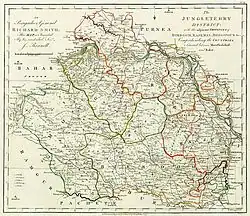Jungle Terry
Jungle Terry or Jungleterry, from Hindi: जंगल तराई jangal tarāi, meaning 'jungle lowland', was a term applied in the 18th century to an area bordering Bengal and Bihar that included large tracts of Bhagalpur and Monghyr districts, as well as the Santal Parganas district.
| Jungle Terry जंगल तराई | |||||||
|---|---|---|---|---|---|---|---|
| Area of British India | |||||||
 1779 map of the Jungle Terry District. | |||||||
| History | |||||||
| |||||||

Although named as such, rather than an official district the Jungle Terry was a vague border area. The district named Jungle Mahals would be established later in 1805.[1]
Geography
The Jungle Terry was located in the present-day Indian states of West Bengal, Bihar and Jharkhand. It was an ill-defined thickly forested region inhabited by tribal groups such as the Bhumij, the Santhal and the Munda people. William Hodges mentions that the Jungle Terry was located to the west of Bauglepore (Bhagalpur).[2]
The area included the Rajmahal Hills; towns that were close to the area according to James Browne included, besides Bauglepoor or Boglypour (Bhagalpur), Curruckpoor (Haveli Kharagpur), Colgong (Kahalgaon), Birboom (Birbhum), Curruckdea (Kharagdiha) and Guidore (Gidhaur).[3]
Map number two of James Rennell's 1779 Bengal Atlas has the title "Jungleterry District",[2] but the name 'Jungle Terry' itself does not show on the map. Bishop Reginald Heber comments that the "Jungleterry" district is very fertile and that theft, murder and highway robberies are a rare occurrence in it.[4]
See also
References
- Bengal District Gazetteers Bankura, O’Malley, L.S.S., ICS, 1908, Barcode(99999990038739), Language english, pp. 21-41, 1995 reprint, Government of West Bengal from Digital Library of India Archived 2016-02-29 at the Wayback Machine
- Henry Yule, A. C. Burnell, Hobson-Jobson: The Definitive Glossary of British India, Oxford University Press. p. 291
- Browne, James (1788). India tracts: containing a description of the Jungle Terry districts, their revenues, trade, and government: with a plan for the improvement of them. Also an history of the origin and progress of the Sicks
- Bishop Heber in Northern India: Selections from Heber's Journal, p. 110
External links
- Bengal District Gazetteers Bankura, O’Malley, L.S.S., 1908, Barcode(6010010076000), Language English, Geography,Travels And Description from Digital Library of India Archived 29 February 2016 at the Wayback Machine
- The Jungleterry District map
- The Jungle and the Aroma of Meats: An Ecological Theme in Hindu Medicine
- Forest Tenures in the Jungle Mahals of South West Bengal